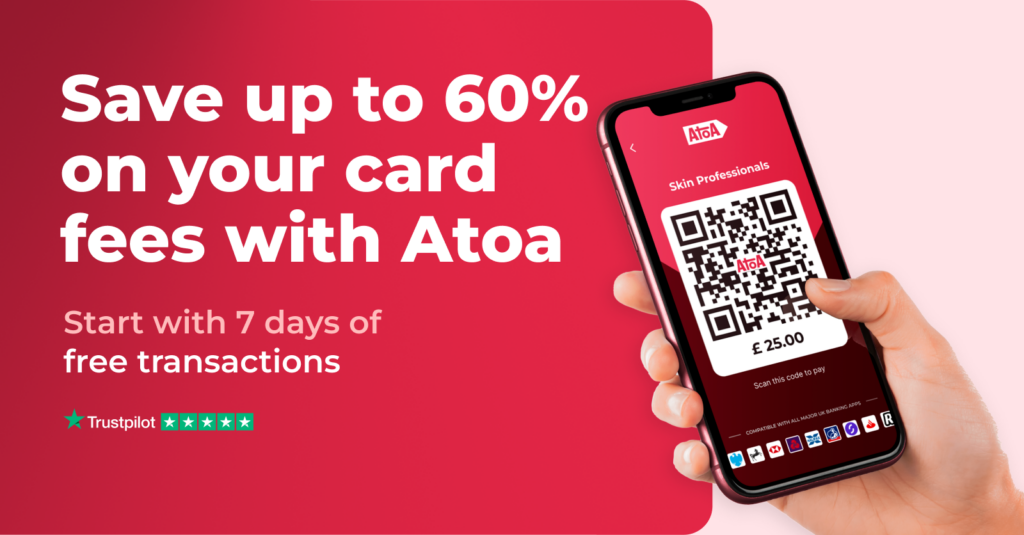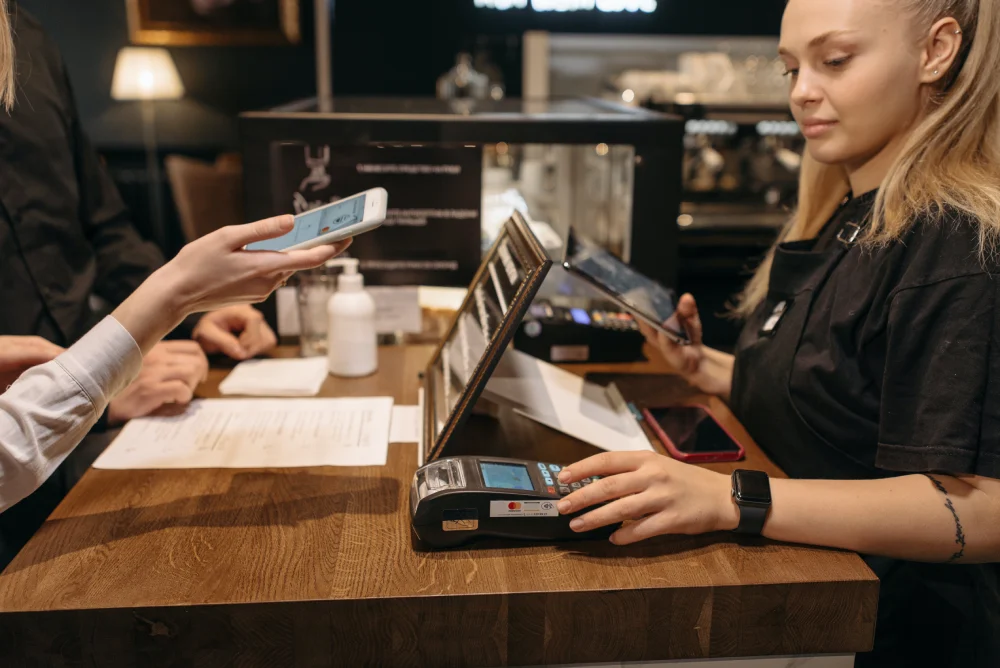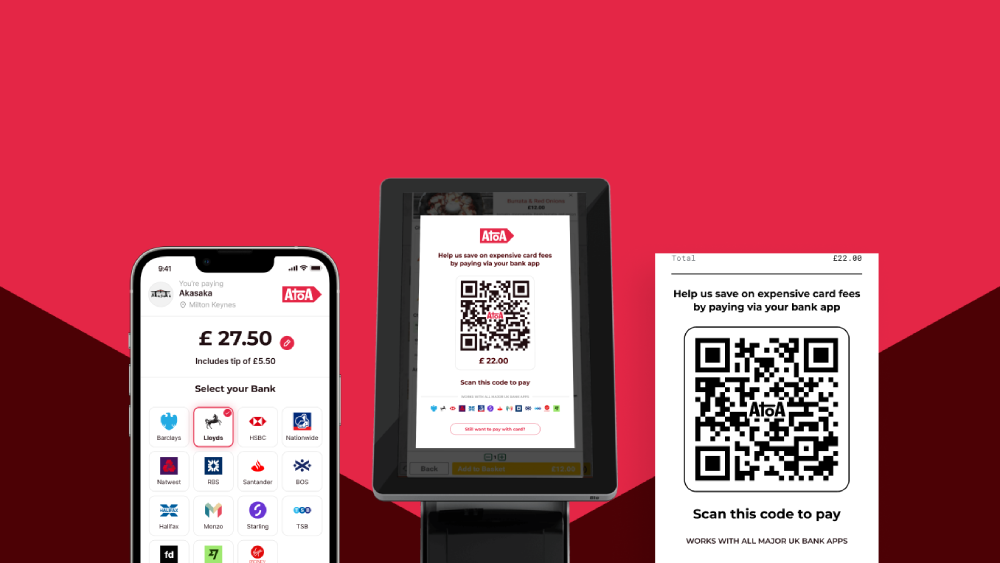Ready to get started?
Easily integrate next-generation payments and financial data into any app. Build powerful products your customers love.
Did you know there are over 5.6 million small or medium-sized businesses in the UK? And while having your own company is exciting, it isn’t always a walk in the park. Between managing stock, paying wages, and getting customers to return, figuring out the best way to get paid can feel like an afterthought. But don’t worry. This guide explores everything you need to know about choosing the right payment system for a small business, so you can spend more time growing it.
In this article, I will discuss:
- The main small payment systems used by UK businesses
- What to look for in a payment system
- How Atoa can help
What are your business needs?
No two businesses are alike, and your payment system should reflect that. Before diving into the options, consider these factors.
Industry: Do you run a brick-and-mortar shop or an online store or offer services on the go? Your industry will influence the types of payments you need to accept. For instance, a retail store may need to accept in-store payments, while a service-based company may focus on online transactions.
Industry: Do you run a brick-and-mortar shop or an online store or offer services on the go? Your location and industry will influence the types of payments you accept and the system you need. For instance, a retail store may need to accept in-store payments, while a service-based company may focus on online transactions.
Business size: A small startup has different needs than a rapidly growing chain. Consider the volume of transactions you handle and whether you need a payment system that scales with your business.
If you’re frustrated with high transaction fees, slow payouts, or a complicated payment process then identifying your current challenges can help you find a system that tackles them head-on.
Re-evaluate your current payment setup
Are your current payment methods serving your business and customers, or holding things back? There might be a gap in your payment strategy. Spotting any challenges like this will show you it’s time for a change:
- Slow transactions: Are your payments slow? Do you spend ages chasing payments, or even worse, waiting for your provider to payout? Switching your small business to a different payment system could save you time and hassle so you can focus on more pressing tasks.
- More fees than profits: Transaction fees can add up, so check your statements to see how much you pay for each payment. Are there any hidden charges? It’s always worth seeing if you can get a better deal elsewhere.
- Frustrated customers: Are your current payment options easy and convenient for customers? Do you use payment methods that busy people expect? Ask your regulars for feedback, it could give you some great ideas to improve their experience.
Take a good look at your current payment methods, you can figure out what’s working and what’s not. That way, you can find a payment solution that makes things easier, saves money, and keeps customers returning.
Payment options for your small business
How people pay is changing fast. To stay ahead, you need to offer convenient options for both you and your customers. Here’s a rundown of the most popular payment methods in the UK today.
Stick with slow traditional methods
Cash is still appealing to market traders or small local businesses. It’s immediate and fee-free but can be inconvenient for customers and a hassle to process as more bank branches close.
Credit or debit cards are widely accepted and convenient for small businesses, but high transaction fees can eat into your profits.
Decide to go digital
Cloud-based POS (point of sale) systems are perfect for businesses on the move or with multiple locations. Think pop-up shops or tradespeople visiting clients’ homes. You can take card payments, track inventory, and create invoices from your tablet or smartphone.
As e-commerce grows, online payments have become essential. Payment gateways like Stripe or PayPal let you securely accept card payments, and platforms like Shopify often have built-in payment processing.
Mobile payments like Apple Pay, Google Pay, and even account-to-account payments with apps like Atoa can speed up purchases. Customers tap their phone to pay, making it fast and convenient making them ideal for busy cafes or shops.

Consider open banking and account-to-account payment systems
Faster, cheaper payment solutions like Atoa use Open Banking to let customers pay you directly from their bank account. This means no card fees, instant settlement, and no more waiting days for your money. No sensitive card details are shared, reducing the risk of fraud. Customers can pay with just a few taps from their mobile bank app, leading to higher conversion rates.
💡A Brighton yoga studio uses Atoa to take class bookings and collect membership fees directly from customers’ bank accounts, saving on card fees and easing up their admin.
The most effective payment mix will depend on your business’s needs and how your target customers shop. Combining traditional with modern methods can offer an experience that keeps your customers happy and your business moving.
Essential payment system features for small businesses
When choosing a payment provider, look beyond just taking card payments. It would be best to have a secure, transparent, and easy-to-use solution with features that help your business grow.
Here’s a checklist of what to prioritise:
Two-factor authentication: Add an extra layer of security for online payments.
Data security and fraud detection: Check the provider follows strict industry standards for cardholder data protection and avoids unauthorised payments.
Transparent pricing: Choose a provider with clear, upfront pricing, so you know exactly what you’re paying for.
Fast setup: Get up and running quickly with a payment method that offers easy onboarding.
Easy to use: Can you and your customers use the system properly?
Quick integrations: Connect your payment system with existing tools like accountancy software.
Other payment system features to look out for
Invoicing: Create and send professional invoices directly from the platform. For example, a freelance graphic designer in London uses a payment system with instant invoice payments.
Payment links: An easy way for customers to pay you remotely in a few clicks or taps.
The right payment system can be an instant boost for a small business. Finding a solution like this can help you get paid faster, speed up operations, and focus on growing your business.
Top 5 payment systems for small businesses
With a growing number of providers available, choosing the right payment solutions can be overwhelming. This table highlights the top 5 providers in the UK to help you make an informed decision.
| Provider | Benefits | Features | How to use |
|---|---|---|---|
| Atoa Instant Bank Pay | Lower fees than cards and instant payouts | Instant bank transfers from customers without sharing bank details | Great for B2B payments and customer payments |
| GoCardless | Simple recurring payments | Direct debits and international payments | Ideal for businesses with subscription models |
| Stripe | Wide range of payment options with easy integration | Card payments and customisable checkouts | Popular with e-commerce businesses |
| Worldpay | Global reach and a known provider | Card processing and online payments with fraud prevention | International and B2B payments |
| Yapily | Cost-effective open banking infratstructure | Account-to-account payment API | Best suited to developers and businesses building finance products |
How The Beauty Wardrobe saved time and money by switching payment systems
The Beauty Wardrobe in Bradford struggled with high card fees and no-show appointments. That was until their manager, Harminder, discovered Atoa, an instant bank payment system that has helped his business grow.
Harminder increased customer deposits by 60-80% with Atoa’s QR codes and payment links. Instant payouts make collecting deposits easier so he’s no longer waiting days funds, which has turned his cash flow around.
FAQs
Which payment system do I need to offer to keep my customers happy?
Think about who your customers are and how they like to pay. Card payments are a must, but consider if things like mobile wallets, contactless taps, or even those ‘Buy Now, Pay Later’ plans would make their lives (and yours!) easier.
How can I keep more of my business income?
Payment processing fees can lower your profits. When comparing payment providers, really dig into those transaction fees, monthly charges, and any setup or equipment costs. Be on the lookout for sneaky fees like chargebacks or early termination penalties.
How do I protect my business from fraud?
Keeping your customers’ information safe is a top priority. Look for a payment system with strong fraud prevention, maybe even things like fingerprint or face recognition. Plus, make sure they follow industry security rules and regulations.
What happens if I switch to a different payment system and something goes wrong?
Tech issues happen, and when they do, you need help fast. Choose a provider with high-rated customer support that offers multiple ways to contact them with real people ready to assist.
The bottom line
Choosing the right payment system is essential for small businesses to grow. Consider factors like security, and how affordable it is and you can find something that makes your business run smoother and with more profits. By asking the right questions and researching, you can find the perfect solution for both you and your customers.
Adaptability is key. Look for a provider to keep up with your business’s changing needs. Brands such as Atoa stand out as a top choice, with fair and transparent pricing making it a reliable partner for small businesses in the UK.
Partnering with Atoa will help you get paid faster, reduce costs, and, most importantly, improve your customer experience.
Try the free 7-day trial and join 1000s of UK businesses already using Atoa to save up to 60% on every transaction.


